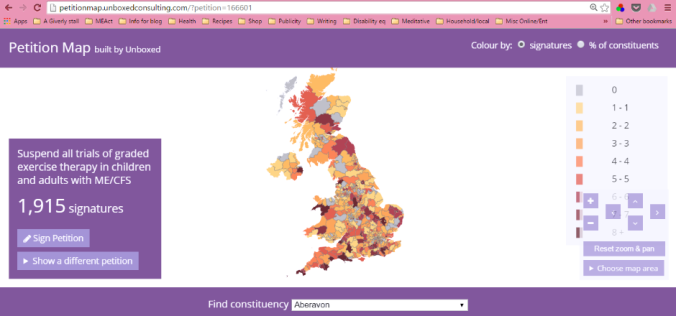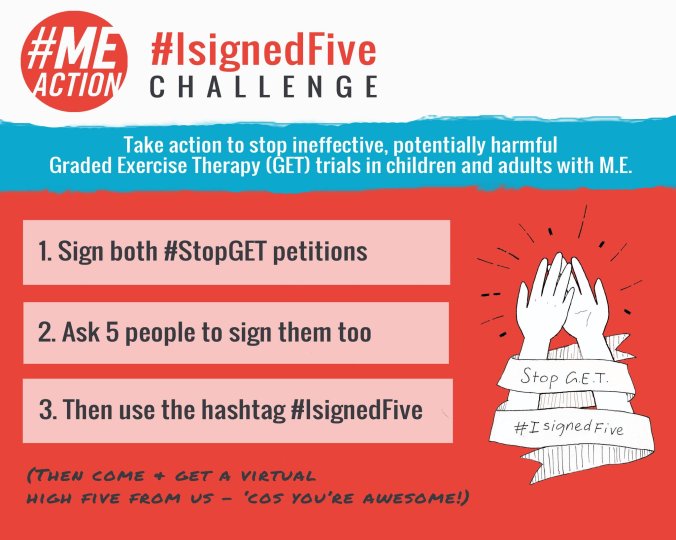Contents
Imagine this scenario
What are the battles ahead before we can win the war?
Irrelevant yet harmful psychosocial research
Operation #stopGET
Identifying potential allies
Recruiting the allies
Imagine this scenario:
In 10 years’ time your niece has the first symptoms of ME. She goes to her doctor and biomarker blood tests are done immediately. These pick up her specific abnormalities (perhaps the precise nature of her hypometabolic issues and/or an active pathogen). Her doctor says “This used to be a very serious condition, but now we know how to treat it. This is your prescription, you should also follow the advice on this leaflet”. Within a few weeks the imbalances are corrected and she returns to normal life.
She doesn’t experience any associated trauma from disbelief and lack of support. She is under no pressure to undertake symptom exacerbating regimes, such as graded exercise therapy, as these aren’t even mentioned. She doesn’t lose her career. She is able to go on to have her own children. Why wouldn’t she?
We fight these advocacy battles now not just for our own wellbeing in the short term, but for the generations that come after us (1).
What are the battles ahead before we can win the war?
How do we get to that future from where we are today? I really believe this is achievable. It appears to me that the battalions we need to defeat are:
1. Research resources going into graded exercise therapy, CBT and related but essentially irrelevant psychosocial interventions
2. Lack of resources going into biomedical research (even with this constraint the biomedical research is really getting there though)
3. Due to the above, treatment centres using inappropriate psychosocial therapies (eg NICE guidelines in the UK) rather than knowing how to use biomedical treatment
4. Dismissive societal attitudes towards ME
These issues are too big to solve in one go and one campaign. We need good strategy and to unite behind each well-devised tactic, one battle at a time.
In the end we will win the war.
Irrelevant yet harmful psychosocial research – battle number 1
At the moment we are getting somewhere fast in the first battle. It may not be all over by Christmas, but the victory will come. This is where ME Awareness troops need to congregate and recruit allied armies too.
PACE data has been released now and even new analysis from the researchers themselves shows the ineffectiveness of GET and CBT. Only 1 in 10 people in the GET group showed additional improvement (so presumably 9 out of 10 people with ME don’t! And yes I know why the 1 in 10 may not even have ME). We don’t yet have accurate information about the proportion who experienced negative effects vs no benefit, but if it is anything like existing patient surveys, harm would be between 50-75%. That is a lot of unnecessary pain and suffering.
At the same time though there are some new GET studies coming at us from different directions. How do these studies continue to get funding and ethical approval?! It is usually very difficult to pre-empt them because we only hear after they have funding and ethical approval.
MAGENTA is a UK graded exercise therapy study on children in the UK. It is particularly strategic to challenge MAGENTA right now, before the larger study is approved (following the 1st phase Feasibility Study), and hundreds of children are subjected to a treatment which is at best ineffectual and at worst deeply harmful. In this case we have unusual forewarning that a new study is on the way, because of the initial feasibility trial.
MAGENTA and UK GET studies are the current focus of the new campaign #stopGET.
Operation #stopGET
I’m sure that you have seen by now that #stopGET has two petitions. One of these is a UK Government petition and the other demonstrates the strength of global support (only UK citizens are allowed to sign a parliamentary petition). They both demand that the UK Government requests research councils to suspend graded exercise therapy trials until the evidence is reviewed. On advice from experienced officers, the #stopGET team chose this as it is likely to be the most effective tactic towards getting something done (the Government likes to be seen as neutral in fights over research, but can request that evidence is reviewed).
SIGN NOW IF YOU HAVEN’T ALREADY
For the UK petition an important victory will be getting to 10,000 signatures. This is the threshold that will trigger a Government response. That size of response can also be used as a tool in the future battles (for example illustrating the strength of patient feeling when we challenge the NICE guidelines).
If we can succeed in suspending GET research in the UK this will be a significant deterrent to researchers across the globe. Applying for research takes effort and GET studies will become a much less attractive option.
Identifying potential allies

300,000 names well we can dream!
The obvious thing you need to do is sign the petition and share on social media (#stopGET with #pwme or #MyalgicE). This is the first step to getting this moving.
However, most of us are going to need to do a little bit more than this in order to achieve thousands of signatures (those with SevereME have a hospital pass of course).
The recruiting allied armies reference I made above is particularly key, and where you can help out the most. Although we feel isolated most of us do have some contacts left.
Encourage them to sign and share enthusiastically, and ask them to let you know when they sign.
Let us all know too when you get other people to sign – you can use the hashtags #Isigned5 or #Isigned10 – this will be really encouraging.
Who do you know who would be concerned about MAGENTA in some way? Relatives who feel helpless and would like to feel they are doing something? Friends who are parents of children – they can imagine their own children being in that situation? Perhaps you know people who are in remission from ME? Or people with ME who don’t normally go online? Or people with other disabilities and health conditions who would be keen to offer us their solidarity? Or people who are really into research ethics or human rights?
You know key people who the rest of us don’t know.
We can also locate constituency gaps from this Petition Map:
 http://petitionmap.unboxedconsulting.com/
http://petitionmap.unboxedconsulting.com/
If an area is grey or pale, do you have a friend there? Most people are still amazingly local even online, so if you tap into their local networks we could have reasonable support in grey areas in no time.
At the time of writing, areas with no signers include Ludlow, Penrith, Angus, East Londonderry, South Suffolk.
Recruiting the allies
If writing facebook posts, emails and talking to people you may want to read my last post about being advocacy savvy first. In particular, following this structure can help:
1 shared values – focus initially on what you will likely agree is important about GET research, this could be different depending on who you are contacting (ethics/ harm to children/ quality research/ disability voice)
2 the system is broken – PACE is the obvious main example here, MAGENTA uses PACE to justify its existence but PACE is too flawed to be the basis of any new study, let alone a child one which should require prior evidence of benefit in adults. But for your audience that might be too technical and you just mention patient survey reports of harm being ignored
3 the problem could happen to anyone – larger study will be larger and involve lots of children/ perhaps something about ME being a major cause of time off school/ hundreds of patients reporting harm in surveys
4 this is how you can help fix it – links to petitions but also strong message that we need access to their networks, this isn’t just about signing
5 never be the 1st to mention opposing arguments – don’t mention anything at all about theories behind GET, this will only be confusing and counterproductive
Here are a few ideas for methods to recruit these identified people to the campaign. You probably have some ideas yourself. Please comment below the post:
• Family email: I sent an email to my extended family. They live all over the country and have diverse networks (if you want to re-use some of my content to send emails click here – link email pdf). In the past in a fundraising family email I mentioned the heritability of ME – but I did this with trepidation not knowing if they’d get overly anxious – think carefully before you do it. It did seem to work OK, they donated money and my parents have continued to do fundraising events (for ME Research UK).
• Email/forum signature: My partner has updated her email signature to include this publicity pic which is hyperlinked to go to the campaign website www.stopGET.org

This would be even better:
• Social media updates: It is easy to share on social media when you first sign the petitions. Perhaps you can also add update comments, such as number of signatures each day? People like to sign a popular petition – it is a form of social proof – it becomes the thing to do!
• Asking people directly does work. I did it for ME Awareness Day. Let them know that you want their support in particular (pick a reason why), this isn’t just the blanket message to everyone you know. If you have Twitter lists or similar you might want to directly tweet people from outside the ME community. You can also pick influential people, although really famous people have their notifications switched off (the almost famous, or those with under 10,000 followers are probably your best bet).
• Your MP: I am planning to contact my MP and ask for her support (using this example letter).
What do you plan to do? What has worked for you before with advocacy campaigns?
We can win this, get those signatures coming in!
If you like this post you might also be interested in:
The one where I write about being Advocacy Savvy
My experience of temporary paralysis
Footnote
1 On a recent #MEAction survey (link) I noticed that over a quarter of us have close relatives with ME too, so when I refer to generations after us I mean our direct relations, as well as humanity as a whole. This is also a good reason to get our well relatives to onboard with ME advocacy campaigns.
We really need good quality studies with strict criteria and objective markers ie physiological and/or biomedical. Studies on the use of heart rate monitors and staying under your anerobic threshold:
LikeLiked by 1 person
Pingback: Blog Anniversary: 4 year recap | Tips for ME